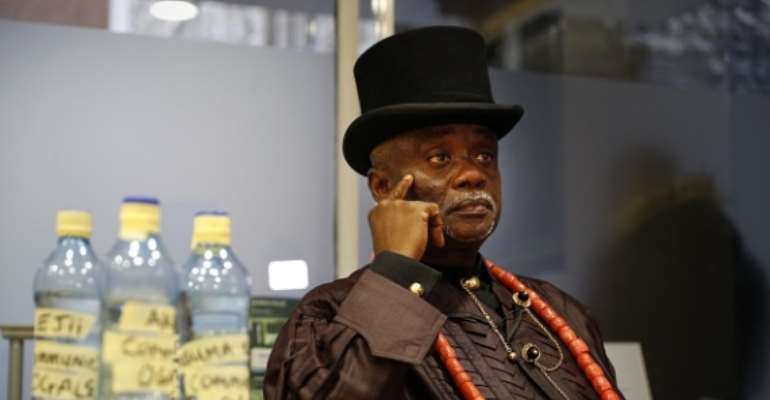London Court: Royal Father Confirms Buhari's Statement That Judiciary is Corrupt..Indicts Shell Petroleum
...No money would be enough to address the damage, Royal father says

A traditional ruler from the Niger Delta, King Emere Godwin Bebe Okpabi, on Tuesday in a London court said that the Nigerian legal system is corrupt.
“Shell is Nigeria and Nigeria is Shell. You can never, never defeat Shell in a Nigerian court. The truth is that the Nigerian legal system is corrupt,” he said.
The Royal father was in London to attend a hearing on the environmental damages caused by years of oil spills in Nigeria blamed on oil company Royal Dutch Shell. Britain's High Court began to hear arguments on whether English courts can hear two legal claims on behalf of more than 40,000 Nigerians against Shell and its Nigerian subsidiary, Shell Petroleum Development Company of Nigeria (SPDC).
During the hearing Tuesday, King Emere Godwin Bebe Okpabi held plastic bottles believed to contain contaminated water from his community in Ogale, claiming "my people are drinking this water."
"There are strange diseases in my community – skin diseases, people are dying sudden deaths, some people are impotent, low sperm count," he was quoted by AFP as saying. "I can afford to buy water. But can I afford to buy for everybody? No. We are dying.
He wants the High Court to compel Shell to implement a 2011 landmark report by the UN Environment Programme (UNEP), which warned of dangerously high levels of hydrocarbons in the water, bitumen-coated mangroves and poor air quality.
It should order the company to “go and clean-up Ogale, go and provide water for them; go and do medical history for them, and where medical attention is needed provide for them,” he said.
The king said no money would be enough to address the damage, which UNEP warned could take 25 to 30 years to resolve, but wants compensation, adding: “We are dying.”
Shell will challenge the jurisdiction of the English courts in the case during three days of hearings this week, while it also disputes the claims made by lawyers Leigh Day, who represent Ogale and the smaller Bille community.
“Both Bille and Ogale are areas heavily impacted by crude oil theft, pipeline sabotage and illegal refining which remain the main sources of pollution across the Niger Delta,” a company spokeswoman said.
She noted SPDC has not produced any oil or gas in Ogoniland, the region surrounding Ogale, since 1993.
But Okpabi and his lawyers say the company’s ageing, leaky pipelines still run through the region and it must take responsibility.
SPDC says it has delivered water and health care to the community and is supporting the implementation of the UNEP process by the government, which in June launched a $1 billion oil pollution clean-up programme in the Niger Delta.
Okpabi said he believed President Muhammadu Buhari is “sincere” in wanting to address the issue, but warned: “If we wait for the system to roll on its own, I hate to say this, but it may be too late for the people of Ogale.”
Royal Dutch Shell and British Petroleum started oil operations in the area in 1958, after oil was first discovered in Nigeria in 1956. They were later joined by several other companies.
It has been estimated that at least 7,000 oil spills occurred in Ogoniland and the rest of the Niger Delta between 1970 and 2000. The damages of oil spills on the environment and communities led to the creation of the Survival of the Ogoni People (Mosop) movement, led by Ken Saro-Wiwa. The leader was later arrested and executed amid widespread condemnation.
Militants in the region took hold in the early 2000s, following the deterioration of people's living conditions blamed on the increase of oil-related activities by foreign exploration corporations. Tensions flared in the local communities as some ethnic groups felt they were being exploited and did not benefit from the crude oil on their land.
Two major spills occurred in the Bodo community in 2008, destroying thousands of acres of mangroves and fishing populations. In 2015, Shell reached a $84m settlement with the Bodo fishing community affected by the spills.
In November 2015, a report by Amnesty International and the Centre for Environment, Human Rights and Development accused Shell of failing to implement the 2011 UN recommendations.
In March 2016, the two communities sued Shell in London over multiple oil spills in the Niger Delta.
